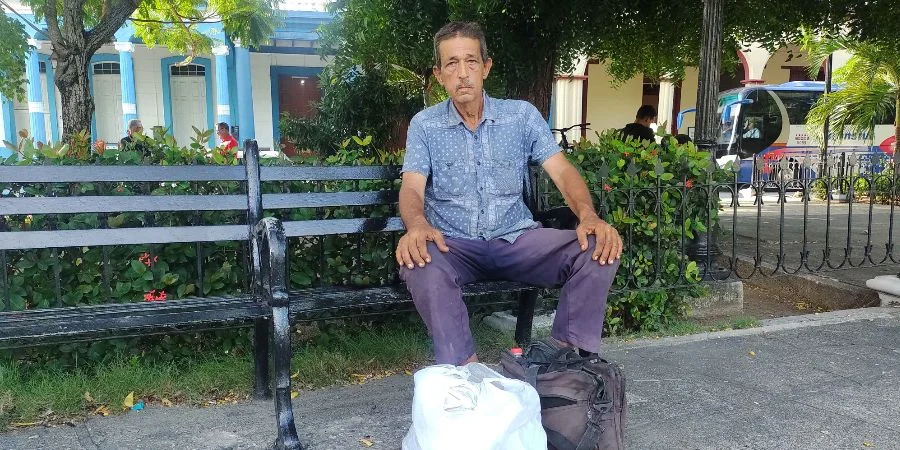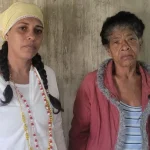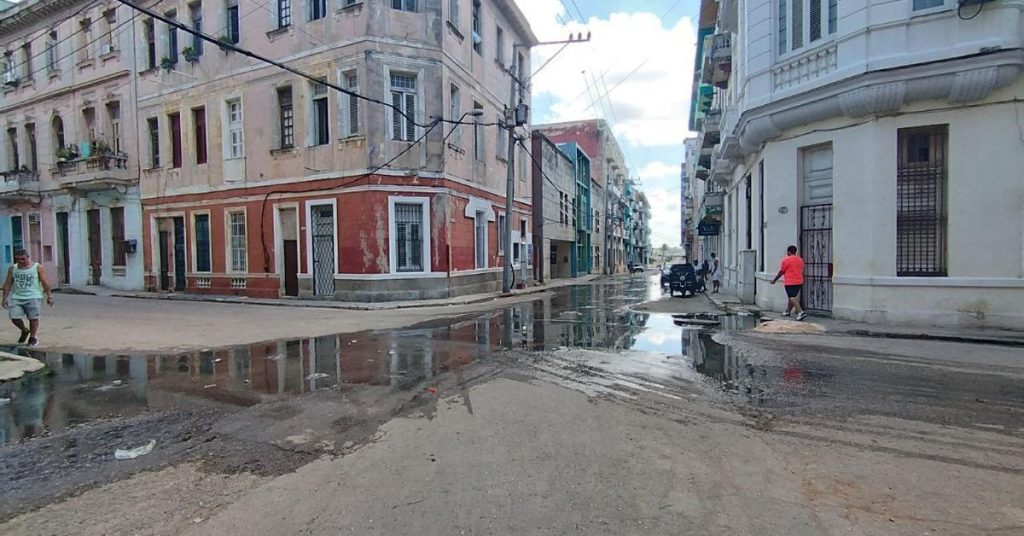HOLGUÍN, Cuba. – Freddy Camilo Morffe Fuentes’ only condition for granting this interview to CubaNet was to be able to say his décimas. The writer, who now lives on the streets of the city of Holguín, has been awarded several prizes, among which stands out his mention in the Ibero-American Contest of the Written Décima Cucalambé, in 2003.
Morffe Fuentes has published the titles In the cathedral of time (Minimal Anthology, Ed. Holguín, 1994), Harp and bonfire (Spain, 1999) and The elf told me (Holguín Editions, 2008), among others.
However, today the 55-year-old man lives in poverty. In two bags that he carries through the streets of Holguin He carries the only things he owns, he says: a bottle of soda, two sweaters that he uses as a pillow, a plastic container where he sometimes puts food, a notebook and a pencil to write in when he can.
―Where do you sleep? Where do you live?
―Currently I sleep in the doorway of a school, other times in the doorway of the Martí cinema. Sometimes I go to a cousin’s house and ask him to let me sleep in the yard of his house.
―Do you feel abandoned?
―Yes, I feel abandoned. Today, for example, I feel dejected, distressed. I have no money and nothing to eat. My royalties have not come in for eight years. I really have no money. In truth, everything has failed.
-Because?
―I don’t know. Life is bright for others, but mine is full of hardship.
―Where did you live before?
“I had a home, a family, but everything was falling away.”
―Can anyone help you?
―Twice a week the Catholic church He gives me lunch. Pastor Michel helps me with a cup of coffee, bread and other things. I have begged for alms, but I don’t usually do that. I have sold some of my poems. Last week I gave some love poems to a girl and she gave me 200 pesos. But I need someone from the government to help me, because I won’t be able to survive like this.
―What was your literary training?
―Through literary workshops. Later I drank from the sources of our Juan Cristóbal Nápoles Fajardo, El Cucalambé; of Jesús Orta Ruiz, the Indian Naborí, and other universal authors.
In 1993 I started in the Provincial Council of the Hermanos Saíz Association. I was in the first May Pilgrimages.
Throughout my life I have done activities for children, adults, nursing homes, grandparents’ homes…
My last jobs before I got sick were the social project “Por la vida” (For Life), where I carried out activities at the Grandparents’ Home and the Children’s Home without Filial Support. There was a time when I worked as a reader at the Lázaro Peña cigar factory and at the tobacco shop in the town of San Andrés.
I have carried out literary activities in all the centers of the province and at the headquarters of the UNEAC in Holguin.
―When was the last time you wrote?
―Well, these days I’ve tried to write something, but I can’t do it. Really, day by day what I try to do is see how I feed myself.
―What have you written?
―I have written three verses dedicated to the Lord. One of them:
Help me, Lord, to bear the pains
and torments of this world.
I must rise from the depths
and bury all my sorrows.
It’s time to conquer again
the heavens of the path that guides me
I still have so much life left
and despite so much death I do not perish.
At the end of the road I am grateful
the light that God offers us every day.
―Why are you in this condition?
―Because of the bad decision I made in donating my house, but also because there are tremendous blows, as the Peruvian poet Cesar Vallejo says. Because there are blows in life that are so violent, I don’t know.
In three months and eight days I lost my mother, who was once my wife and my best friend.
―And the future?
―If someone helps me, I would like to be able to be with the children, I would like to do the poets’ gathering in the courtyard of La Periquera again. If I could change and improve my appearance, I would do the gathering even if I don’t get paid. It is worth reclaiming that space in the city centre.
―What do you need right now?
“I need a little help, to eat, above all to have a place to live, to have some money, to be paid my royalties so I can then have another life: to eat.”
―What do you carry in your bags?
―The only things I have. Two sweaters that I use as pillows, a container where I sometimes put food, a notebook and a pencil to write when I can. My belongings. This is the only things I have.
―Where will you eat and sleep today?
―Today I’m going to sleep under the stairs of the Calixto García semi-boarding school. In truth, I might be able to eat, but I’m not sure yet. I’ll try to see if someone can help me. I trust that they’ll give me a place to live, so that, God willing, I can change my life and continue writing.
*In order to find out why the writer lost his house, for several days and at different times, CubaNet He visited the house where he lived, but never found anyone.
CubaNet He also confirmed several sources close to the Morffe Fuentes family, who, on condition of anonymity, agreed that the writer, treated for alleged schizophrenia, lived alone until he made a deal with his niece. The agreement was that if she arranged a place for him to live and be cared for, he would, in exchange, legally give his house to her.
In this way, the house passed into the hands of the niece after she, following several efforts, managed to have Morffe Fuentes accepted into the Social Rehabilitation and Reinsertion Center located in the Kampuchea neighborhood of Holguín.
According to those interviewed, the place “was not what Freddy expected” and he ended up running away. According to the witnesses, the writer preferred to live on the street and not return to the Rehabilitation Center.
The sources also confirmed that Morffe Fuentes does not drink alcohol and that he has received electroshock therapy for his psychiatric condition.

















